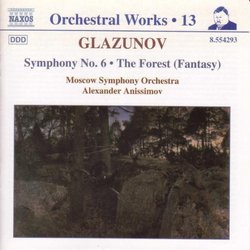| All Artists: Alexander Glazunov, Alexander Anissimov, Moscow State Symphony Orchestra Title: Glazunov: Symphony No. 6 / The Forest Members Wishing: 0 Total Copies: 0 Label: Naxos Release Date: 5/16/2000 Genre: Classical Styles: Forms & Genres, Fantasies, Symphonies Number of Discs: 1 SwapaCD Credits: 1 UPC: 636943429327 |
Search - Alexander Glazunov, Alexander Anissimov, Moscow State Symphony Orchestra :: Glazunov: Symphony No. 6 / The Forest
 | Alexander Glazunov, Alexander Anissimov, Moscow State Symphony Orchestra Glazunov: Symphony No. 6 / The Forest Genre: Classical
|
Larger Image |
CD Details |
CD ReviewsA strong advocacy in Anissimov. David A. Hollingsworth | Washington, DC USA | 05/13/2000 (4 out of 5 stars) "The sense of spontaneity and drama are ever so present in Glazunov's Sixth Symphony that it continued to a popular work. Composed in 1896, the Symphony, arguably his masterpiece, shares some of the Tchaikovskian passion and directness. The first movement is appealing from beginning to end & the theme and variations Second movement shows the composer's inventiveness @ his very best. The Intermezzo is sparkling while the finale, somewhat weak structurally, placed a rather exhilarating end to the otherwise among the strongest symphonic arguments which flowed from the composer's pen.The symphonic poem "The Forest", of 1887 is a more youthful endeavor from Glazunov. Despite some echoes from Liszt and Wagner, the piece is remarkably resourceful, inventive, and imaginative. I would not be surprised if Paul Dukas listened to this work before composing Sorceress Apprendice. The orchestration is especially a sign of sheer craftsmanship and certainly measures up to Stanka Razin, the Sea, and to a large extent, the Seasons.Alexander Anissimov and the Moscow Symphony Orchestra performed the works with strong advocacy and commitment. The Sixth Symphony was especially well performed and I admire the warmth he brings @ the middle movements. Anissimov's chose of tempi in the First and Third movements is questionable, however. I find them lacking zest and a sense of urgency. Fedoseyev and the USSR Radio and Television Large Symphony Orchestra managed to be absolutely thrilling in their performance of the work. Meanwhile Golovanov and the Moscow Large Radio Symphony and to some extent Svetlanov and the USSR State Symphony added more charisma and individuality in theirs. Furthermore, the brass of Moscow Symphony under Anissimov is disappointinly muddled and lacks the crisp and bloom of the London Symphony under Yodani Butt (ASV recording) or of Fedoseyev's orchestra for that matter. The strings likewise lack a certain weight. Anissimov's performance of "The Forest" is altogether well done, although lacks Svetlanov's sense of refinement and imagination in places.The recording quality is fair and tolerable, although rather congested and lacks atmosphere and dynamic range compared to the ASV's recording of the Symphony. To sum up, this Naxos CD is recommendable, despite my strong preference towards Fedoseyev's Melodiya LP recording (never re-issued into a CD medium). Should you be a person who desires a first-class recording of the work, then go for Butt and the London Symphony under ASV (with the performance hardly less passionate than Anissimov's). But should you desire pure passion, authority, and charisma, then look for the Fedoseyev's Melodiya recording (in a library or in any record shops specializing in collecting old and new recordings of rare masterworks). The Olympia CD reissue of Rozhdestvensky & the Ministry of Culture Symphony is worth looking into, despite his questionable choice tempo in the First movement (Incidentially a little slower than Anissimov's). Otherwise, this Naxos CD is worth checking out, though not really a first choice." Glazunov rocks! God's Will Know-it-all | Elko County, Nevada | 01/30/2009 (5 out of 5 stars) "Nice CD with great sound. Glazunov sounds better and better with each hearing. Sure, he wasn't a first rate, Beethovenish composer ... but he was still a genius! Better Glazunov than some wannabe, mid-20th Century composer monster with the will to be great but without the talent ... or sanity."
|

 Track Listings (5) - Disc #1
Track Listings (5) - Disc #1